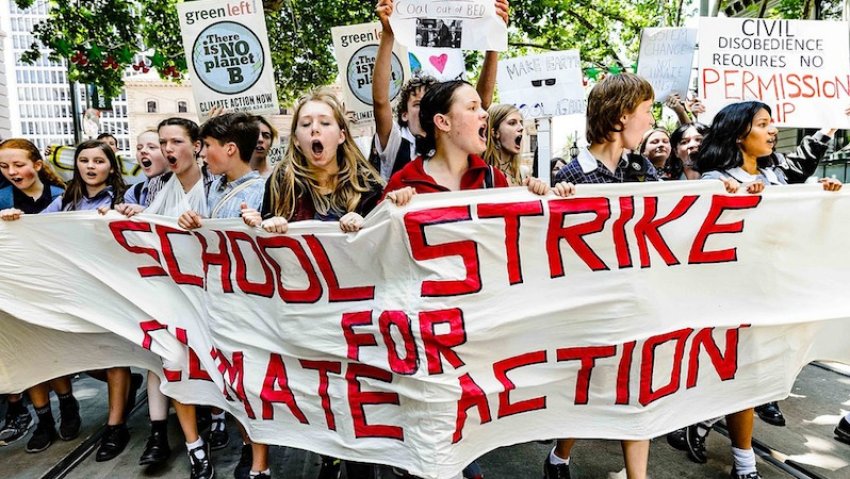
Support for the September 20 student-led global Climate Strike is growing in Australia as the big day nears. Councils, unions and churches are declaring their support and more strikes are being organised every day in what is building up to be the biggest day of protest since the 2003 anti-Iraq war mobilisations.
Randwick Council, in Sydney's east, unanimously voted on August 27 for a Greens motion to support the Climate Strike and “encourage” all councillors to attend. This included the four local Liberal councillors.
On September 11, Moreland Council in Melbourne’s north-east agreed to support the strike, though Socialist Alliance councillor Sue Bolton was unsuccessful in getting support for an amendment which would have allowed employees to attend on full pay and without the threat of penalties.
Fremantle council in West Australia has also come on board with the CEO sending a message to council employees stating council “acknowledges the reality of a climate emergency” and urging them to take advantage of its “flexible working arrangements” to attend the strike.
The letter noted council's continued support for renewable energy and tree planting programs and said it was “keen to support programs and activities to make sure there is an appropriately strong response to the challenge of climate change”.
Not all councils have reacted this way. Liberal and Labor councillors on Inner West Council, in Sydney, blocked the Greens from putting a motion to endorse the Climate Strike.
Port Phillip Council in Victoria said employees could “take annual leave” to attend the strike but refused to support it on grounds that there would be “a range of views” on students leaving school to take part.
This was despite the council's Youth Advisory Committee proposing it support the strike. In a letter to councillors, the committee explained its reasons: “From rising sea levels to diminishing resources and increasing extreme weather events, it is young people that are going to be experiencing the effects of climate change first and worst.
“Climate change is a generation-defining issue that directly puts our futures, as young people in jeopardy.”
More universities have come on board.
Charles Sturt University acting vice-chancellor Professor John Germov encouraged staff and students to attend in a September 9 statement. He added no-one would be penalised for missing class and that the university’s stance was “consistent with its unwavering commitment to environmental causes”.
Charles Sturt is Australia's first carbon neutral university.
Melbourne University management responded to a petition, signed by more than 800 students and staff urging support for the Climate Strike, saying on September 10 that people were free to decide what to do, but that teachers must “accommodate” students who did not attend the strike and that staff must seek permission to go.
Students are now organising to get motions passed in every class to mobilise as many students as possible and pressure university management to allow staff to attend without risking a penalty.
United Voice has joined the many unions mobilising for the strike, saying on September 10 that it “stands proudly” with those students who are “fighting for action on the climate crisis”.
It said: “We recognise that climate change is having ever increasing impacts on working people, particularly those in regional areas affected by floods, fires and drought”.
The union also said it was inspired by and supported “the passion and action of students who are working together to bring about change”.
The Australian Nurses and Midwives Federation is also on board. The Victorian division even made its own video promotion to explain why it is supporting the strike, which focused on validating (particularly) young people's fear and anxiousness about the climate change threat and argued that action is an antidote to despair.
The National Union of Workers (NSW) is supporting the strike and encouraging its members to take action. In a statement it said: “NUWNSW rejects the notion that Australia is too small to make a difference — Australia has always punched above its weight on issues of injustice against workers.
“NUWNSW also rejects the recent statement by our government that Pasifika peoples will survive the consequences of climate change because their people ‘come here [Australia] to pick our fruit’. NUWNSW stands with our Pacific Islander brothers and sisters fully in their fight.
“NUWNSW supports the necessity of a just transition program for all workers who will be affected due to the transformation in our energy production and mining industries.
“No worker should be left behind.”
Other unions who are attending the rally include: Construction Division of the CFMMEU, NSW Teachers Federation, Maritime Union Australia, Independent Education Union (Victoria Tasmania), State School Teachers Union of WA, Australian Manufacturing Workers Union and the Electrical Trades Union NSW.
The Anglican Church is the second church to come out in support of the strike and since August 18 has been encouraging its congregation to attend.
Spokesperson Dr Carolyn Tan said the General Synod of the Anglican Church of Australia and various Diocesan Synods have called on state and federal governments “to act in decisive ways”.
The “National Day of Climate Change Action”, as it described September 20, “provides the opportunity for all Australians to call on our political leaders to act”.
To date, their lack of action “does not give confidence” that the world has a chance of preventing a temperature rise more than 2°C.
“Political leadership of the highest quality is needed” Tan said. “Individuals can only do things on a small scale and many of us are, but effective national and international action is desperately needed.”
The NSW and ACT Synods of the Uniting Church passed a resolution in July encouraging its 50,000 members across NSW and the ACT to support the strikes.